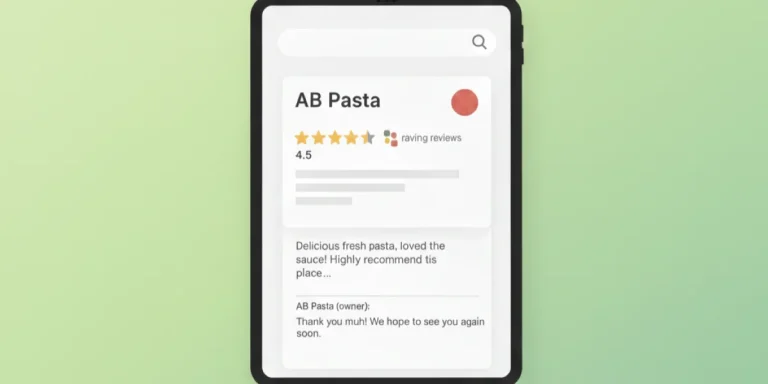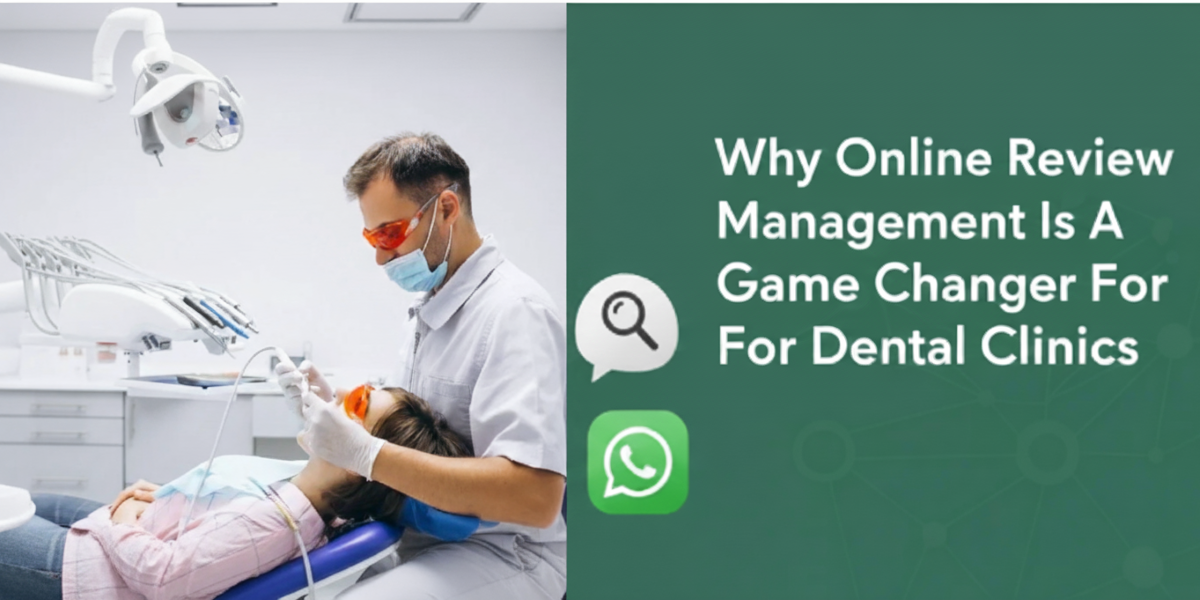
Walking into a dental clinic for the first time can feel overwhelming for patients. They’re trusting someone with their health, comfort, and appearance. It’s a decision that carries significant weight. Before scheduling that crucial first appointment, today’s patients rely heavily on the experiences of others who’ve walked the same path.
Online review management for dental clinics has become the cornerstone of patient decision-making. Sixth City Marketing research reveals that 71% of patients research dentists online before booking appointments, making these digital testimonials more influential than traditional marketing methods.
With patients requiring an average of 4+ stars before booking appointments, your online reputation directly determines whether your phones ring with new patient inquiries or remain frustratingly quiet. Consequently, this shift in patient behavior has transformed review management from a nice-to-have into a business-critical necessity for dental practices.

Why Dental Review Management Is a Game Changer for Clinics
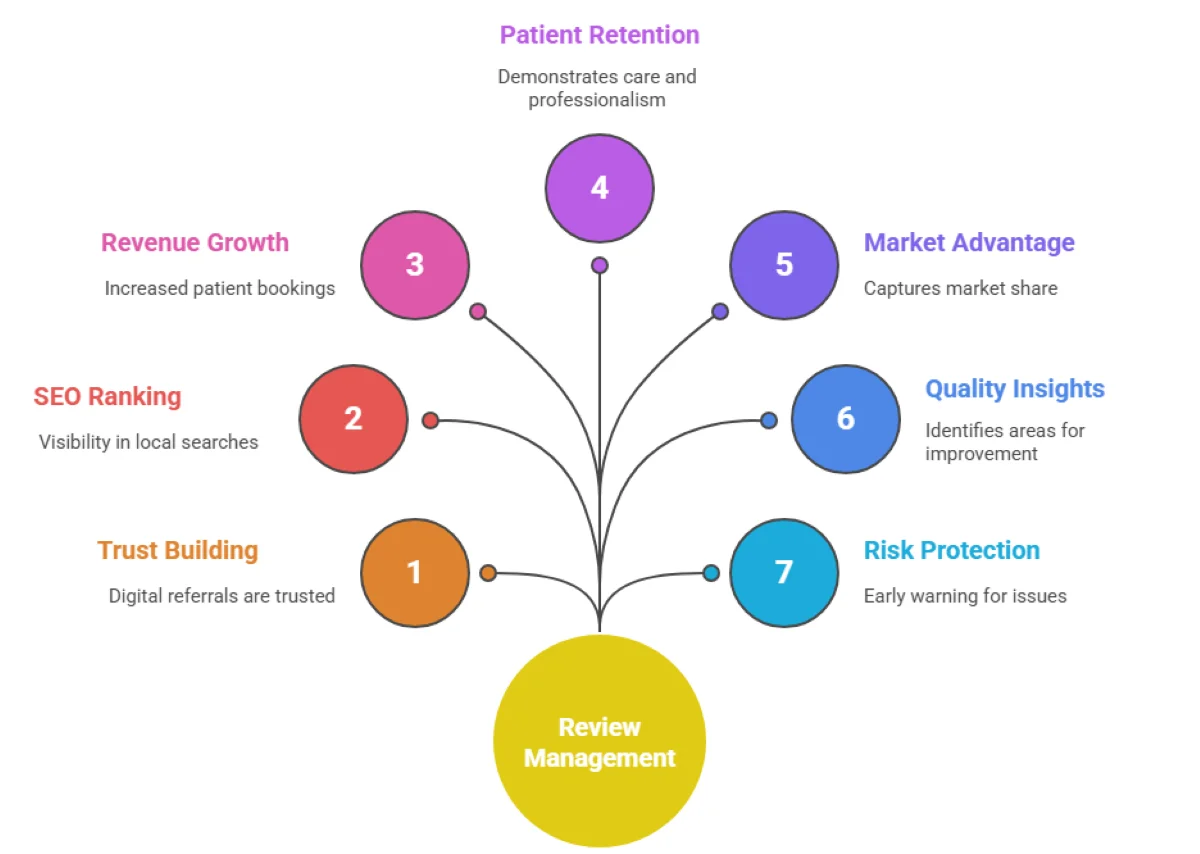
Modern dental practices that embrace systematic review management unlock seven distinct advantages that fundamentally change their market position. Additionally, these benefits create sustainable growth trajectories across all aspects of their business operations.
1. Instant trust building
Patient testimonials serve as digital referrals, with approximately 90% of potential patients trusting online reviews as much as personal recommendations. This immediate trust-building eliminates the lengthy relationship-building process traditional marketing requires. Furthermore, it accelerates patient acquisition significantly while reducing the need for expensive advertising campaigns.
2. Enhanced SEO rankings
Reviews are the second most important local SEO ranking factor, directly impacting your practice’s visibility in “dentist near me” searches. Higher ratings improve search rankings, increasing organic traffic exponentially. Moreover, AI-powered review management platforms like Spreadical help practices maintain consistent review flow, which signals to Google that your business remains active and trustworthy.
3. Revenue growth acceleration
Well-managed reviews generate substantial ROI, with practices seeing significant increases in new patient bookings through improved online reputation. Each positive review directly correlates to increased appointment scheduling. Consequently, this leads to measurable revenue growth for dental practices while reducing overall marketing costs.
4. Patient retention boost
Responding to patient reviews increases retention by demonstrating care and professionalism to both existing and prospective patients. Additionally, this amplifies word-of-mouth marketing through digital testimonials that reach broader audiences organically. Engaged patients become loyal advocates, generating more referrals. Therefore, this reduces patient acquisition costs for your practice significantly.
5. Competitive market advantage
Superior ratings capture market share from competitors, with patients choosing practices with better reviews even when facing higher costs or longer wait times. Strong online reputations differentiate practices in saturated markets. Subsequently, this creates sustainable competitive advantages that are difficult for competitors to replicate.
6. Quality improvement insights
Patient feedback identifies operational improvements, staff training opportunities, and service enhancements that directly impact patient satisfaction. Furthermore, it influences clinical outcomes positively by highlighting areas for improvement. Negative reviews reveal specific issues, enabling targeted improvements. As a result, this enhances overall practice quality and patient experience dramatically.
7. Reputation risk protection
Proactive monitoring and response systems provide early warning for practice issues while offering damage control mechanisms for potential crises. Quick response capabilities minimize reputation damage and demonstrate professional commitment to patient satisfaction. Moreover, automated review management solutions ensure no patient feedback goes unnoticed, providing comprehensive reputation protection.
How do patients choose dentists in the digital age?
Patient behavior has shifted dramatically toward digital research, with online reviews becoming the primary trust signal before making healthcare decisions. Therefore, understanding these patterns is crucial for dental practice success in today’s competitive marketplace.
Digital-first patient journey
Today’s patients follow a predictable path: Google search leads to review reading, which determines whether they call your practice or continue searching. This digital-first approach means your online reputation influences patient decisions before any direct contact occurs. Importantly, this shift has made traditional marketing methods less effective while increasing the importance of review management.
Key research platforms
Google captures the majority of reviews, while healthcare-specific platforms like Healthgrades and Vitals provide additional research channels. Additionally, these specialized platforms help patients seeking specific dental care and specialist services make informed decisions about their oral health providers.
Trust threshold requirements
Patients need a minimum number of reviews before trusting a practice, with most requiring sufficient testimonials to believe they represent genuine patient experiences. Fewer reviews create skepticism, while more reviews build confidence and credibility. Consequently, this encourages appointment scheduling for new patients who feel assured about their choice.
Review recency importance
Most patients consider older reviews less relevant, emphasizing the need for consistent, recent patient feedback collection. Fresh testimonials demonstrate active patient care and ongoing practice operations. Furthermore, they build confidence in current service quality and standards, making recent reviews more valuable than older ones.
Negative review damage
Single negative reviews can significantly reduce conversion rates, while multiple negative reviews can devastate new patient acquisition for months or even years. Unaddressed negative feedback compounds over time, creating lasting damage. Therefore, implementing automated review response systems becomes essential for protecting practice reputation and maintaining patient acquisition momentum.
What does review management really mean for dental clinics?
Effective review management extends beyond simple collection, encompassing monitoring, response, analysis, and strategic leveraging of patient feedback across multiple platforms. Additionally, it involves creating systematic approaches for maximum business impact and sustainable growth.
Strategic engagement approach
Review management involves systematically collecting, monitoring, responding to, and leveraging patient testimonials to build trust and drive practice growth consistently. Furthermore, this comprehensive approach treats reviews as strategic business assets rather than passive feedback collection for occasional monitoring or reactive responses.
Automated vs manual systems
Manual systems require 2-3 hours weekly with inconsistent results and frequent missed opportunities, while automated platforms need only 15 minutes weekly with significantly higher response rates. Moreover, automation ensures consistent follow-through, timely responses, and comprehensive platform coverage that manual processes cannot sustain long-term effectively.
Multi-platform coverage strategy
Successful practices monitor Google, Yelp, Facebook, Healthgrades, and Vitals simultaneously to capture patient feedback wherever it appears naturally. This comprehensive approach prevents reputation gaps and ensures complete visibility into patient sentiment. Additionally, it provides opportunities to address concerns before they spread to other platforms or influence potential patients negatively.
Software integration
Modern review management integrates seamlessly with practice management software, appointment systems, and patient communication platforms for streamlined workflows. These connections automate data sharing, trigger review requests at optimal times, and provide comprehensive patient interaction tracking.
Professional response standards
Strategic responses acknowledge feedback professionally, demonstrate genuine care, and encourage future visits while maintaining HIPAA compliance throughout. Additionally, they maintain professional standards consistently across all interactions. Proper response strategies turn reviews into marketing opportunities while protecting patient privacy and maintaining professional credibility with appropriate tone and messaging.
Benefits of dental-specific review
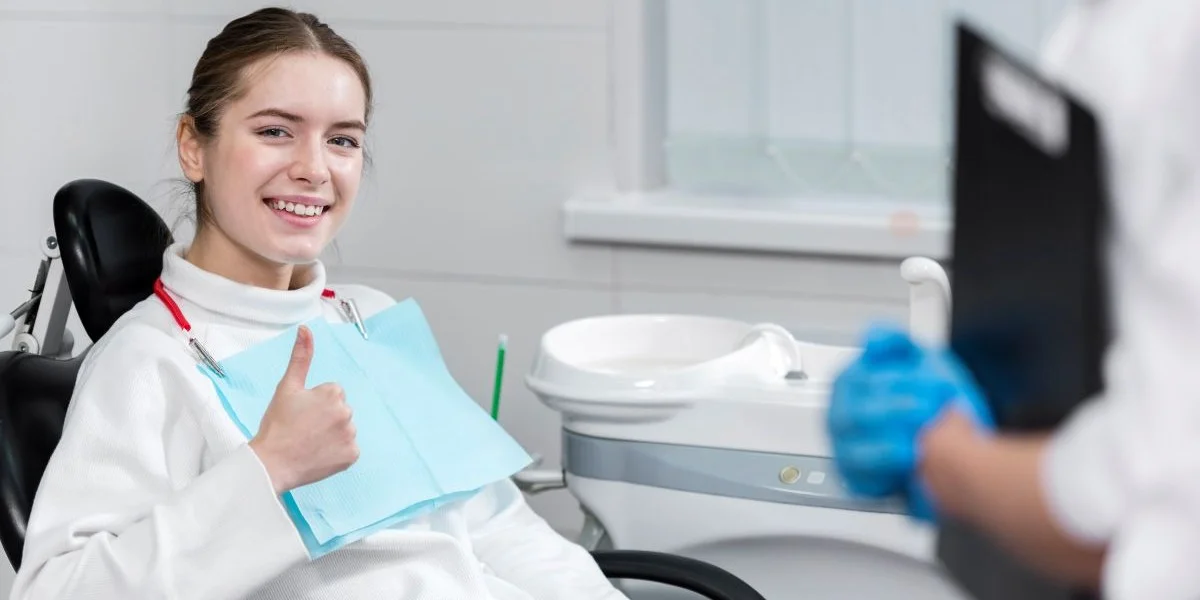
Dental practices experience unique advantages from review management due to healthcare-specific patient behaviors and decision-making patterns that differ significantly from those of other service industries. These specialized benefits make review management particularly valuable for oral healthcare providers.
Higher appointment conversions
Practices with 4+ star ratings achieve significantly higher phone conversion rates and double the online appointment booking rates compared to lower-rated competitors. Strong reviews reduce patient hesitation and anxiety about dental visits. Additionally, they accelerate decision-making, leading to faster appointment scheduling and improved marketing ROI across all channels.
Healthcare platform visibility
Healthcare-specific platforms like Healthgrades and Zocdoc provide additional visibility channels with higher conversion intent than general review sites. Patients using healthcare directories demonstrate serious intent to book appointments, making positive reviews on these platforms particularly valuable. Therefore, maintaining a strong presence across these specialized platforms becomes crucial for comprehensive acquisition strategies.
Team morale enhancement
Regular positive reviews boost team motivation and job satisfaction while providing concrete examples of excellent patient care for training purposes. Public recognition through patient testimonials validates staff efforts and creates a positive workplace culture. Furthermore, this improves retention and performance while reducing turnover costs and maintaining consistent service quality.
Patient education opportunities
Review responses allow practices to educate potential patients about procedures, address common misconceptions, and highlight specialized services or advanced technology. These educational responses serve as mini-marketing messages that inform prospects while demonstrating expertise. Additionally, they build professional knowledge and establish trust with potential patients who may have questions or concerns about dental treatments.
Professional network benefits
Strong online reputations improve relationships with insurance providers and referral sources who increasingly research practices before making recommendations. Professional networks rely more heavily on online reputation data when making referral decisions. Therefore, maintaining strong reviews becomes essential for network participation and professional relationship building within the healthcare community.
Navigating compliance in dental review management
Healthcare review management requires careful attention to patient privacy laws and professional regulations that create unique challenges. These compliance requirements don’t apply to other industries, making specialized knowledge essential for dental practices.
HIPAA privacy protection
Never confirm patient visits or share specific treatment details in responses; use general language that avoids identifying patients or their care entirely. Even acknowledging a patient’s presence at your practice can constitute a HIPAA violation requiring immediate attention. Therefore, this requires careful response language that maintains privacy while addressing concerns professionally and appropriately.
Legal violation consequences
Healthcare practices face significant fines for HIPAA violations when responding to reviews with identifiable patient information or treatment details that compromise privacy. These violations can occur even when trying to defend against negative reviews or provide context. Consequently, comprehensive compliance training becomes essential for all staff members who may interact with online reviews or patient feedback systems.
State privacy laws
Some states have stricter privacy requirements than HIPAA, requiring practices to understand local regulations governing patient information disclosure thoroughly. These additional requirements vary by jurisdiction and may impose higher standards than federal regulations alone. Moreover, they require location-specific compliance strategies that account for regional differences in healthcare privacy laws.
Platform compliance rules
Each platform has specific guidelines for professional responses, fake review policies, and acceptable engagement practices that practices must follow consistently. Violating platform rules can result in review removal, account suspension, or reduced visibility that impacts marketing efforts. Therefore, maintaining compliance becomes essential for sustained platform relationships and effective online presence.
Documentation standards
Maintain detailed records of review responses, patient complaints, and resolution efforts to demonstrate compliance and protect against potential legal challenges. Proper documentation provides evidence of appropriate response procedures and regulatory adherence. Furthermore, it can protect practices during regulatory investigations or legal disputes by demonstrating good faith efforts and professional standards.
How to build a winning review management system?
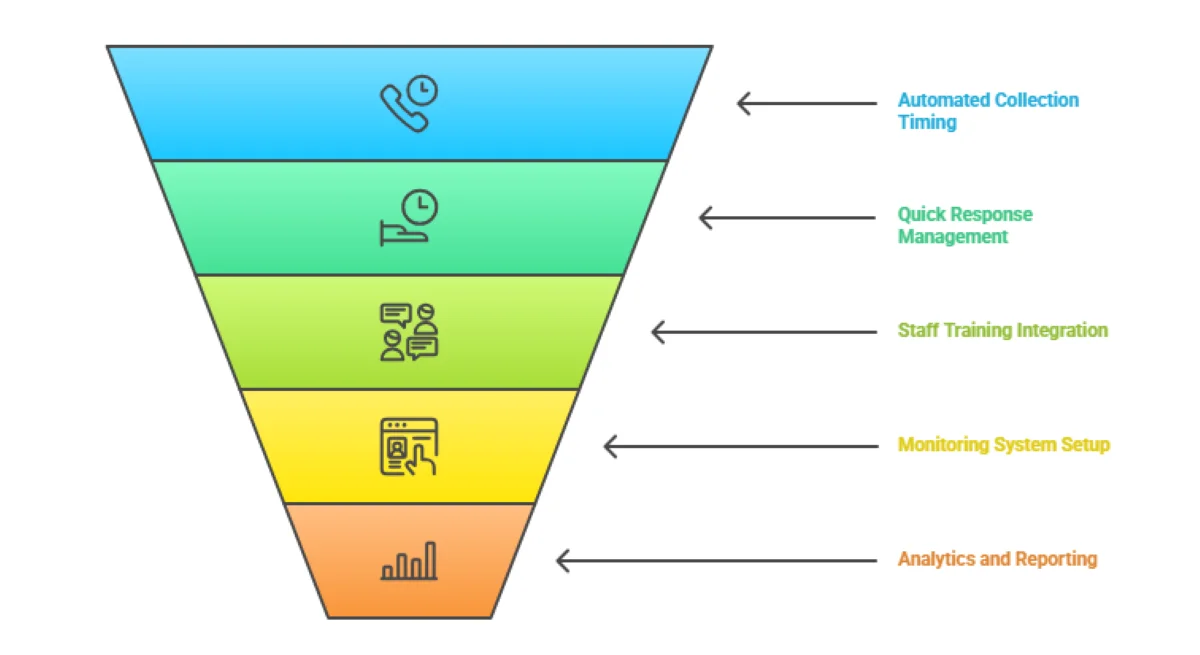
Successful review management requires systematic approaches that integrate seamlessly with existing practice workflows and staff responsibilities. Additionally, these strategies must maximize efficiency and results through proven implementation methodologies that dental practices can sustain long-term.
Automated collection timing
Send requests immediately post-appointment via SMS (45% open rate) and follow up with email (25% open rate) for maximum response rates and engagement. Optimal timing captures positive patient emotions while memories remain fresh and detailed. Therefore, this significantly improves both response rates and review quality while reducing the effort required from practice staff.
Quick response management
Respond within 24 hours for significantly higher engagement rates using professionally crafted templates that maintain personalization while ensuring HIPAA compliance throughout. Quick responses demonstrate attentiveness and professionalism to both reviewers and potential patients. Additionally, they provide opportunities to address concerns before they escalate or negatively influence other patients’ decisions.
Staff training integration
Train all team members on review importance, appropriate patient conversations, and escalation procedures for negative feedback situations that may arise. Comprehensive staff training ensures consistent messaging, appropriate patient interactions, and proper handling of review-related situations. Furthermore, it creates a culture where every team member understands their role in maintaining a positive online reputation and patient satisfaction.
Monitoring system setup
Use automated tools to monitor Google, Yelp, Facebook, and healthcare platforms simultaneously while tracking competitor performance and industry benchmarks for comparison. Comprehensive monitoring prevents missed reviews, enables quick responses, and provides competitive intelligence. Additionally, AI-powered monitoring solutions like Spreadical can streamline this process through intelligent automation and real-time alerts.
Analytics and reporting
Track review volume, response rates, sentiment trends, and conversion attribution to measure ROI and identify improvement opportunities systematically. Regular analysis reveals patterns, identifies successful strategies, and guides resource allocation decisions. Furthermore, it provides data-driven insights for maximum impact on patient acquisition and retention efforts while demonstrating clear business value.
Common challenges that dentists face
Dental practices face predictable obstacles in review management that can be overcome with proper strategies and systematic approaches. Therefore, understanding these challenges and their solutions enables consistent success and sustainable reputation growth over time.
Fake review management
Learn to identify suspicious patterns, document evidence thoroughly for platform disputes, and build authentic review volume as protection against fake attempts or competitor attacks. Fake reviews can damage legitimate businesses, making detection skills and dispute processes essential for maintaining credibility.
Low volume solutions
Address patient psychology barriers by making requests feel natural, timing asks appropriately, and explaining how feedback helps future patients receive better care. Many patients want to help but need gentle encouragement and clear instructions to participate. Relationships and satisfaction levels.
Negative response strategy
Use HIPAA-compliant templates, focus on solutions rather than defensiveness, and take complex conversations offline while maintaining public professionalism consistently. Negative reviews provide opportunities to demonstrate exceptional customer service and professional handling of concerns effectively.
Time management systems
Implement automation tools, create standardized response templates, and establish clear staff responsibilities to minimize time investment while maximizing results and consistency. Efficient systems prevent review management from becoming overwhelming while ensuring consistent execution.
Multi-location coordination
Develop standardized processes, centralized monitoring systems, and location-specific response protocols for dental groups with multiple offices or satellite locations. Multi-location practices require coordinated strategies that maintain brand consistency while addressing location-specific concerns appropriately.
Advanced management features
Modern review management platforms offer sophisticated capabilities that transform basic feedback collection into comprehensive reputation-building systems with advanced analytics. Additionally, these platforms provide automation features that work seamlessly with existing practice management workflows and patient communication systems.
AI-powered analytics
Advanced sentiment analysis identifies trends, predicts potential issues, and provides actionable insights for improving patient satisfaction and operational efficiency proactively. Artificial intelligence can detect patterns humans miss, providing early warning systems and strategic guidance. Therefore, it enables proactive reputation management and practice improvement that prevents problems before they impact patient experience or business performance.
Seamless software integration
Connect with practice management software, appointment systems, and patient communication platforms to create unified patient experience management systems that work together. These integrations eliminate data silos, automate workflows efficiently, and provide comprehensive patient interaction histories. Furthermore, platforms like Spreadical offer WhatsApp integration that brings review management directly into familiar communication channels for unprecedented convenience and efficiency.
Smart automation excellence
Utilize intelligent timing algorithms, personalized message generation, and multi-location management capabilities while maintaining compliance and authenticity standards throughout. Advanced automation balances efficiency with personalization, ensuring professional standards remain high. Furthermore, it reduces manual workload significantly while improving consistency across all patient interactions and maintaining the human touch that patients expect and value.
The future of patient reviews and dental growth
Staying ahead of evolving patient expectations and technology developments ensures long-term success in an increasingly competitive healthcare marketplace. Additionally, understanding these trends helps practices prepare for changing digital communication preferences and emerging industry standards.
Emerging technology integration
Voice reviews, AI-powered responses, and video testimonials are becoming standard expectations as patients seek more authentic and engaging feedback formats that feel personal. These multimedia approaches provide richer patient experiences and more compelling testimonials. Furthermore, they resonate strongly with prospective patients researching dental care options while providing practices with more dynamic content for marketing and reputation building.
Google AI evolution
Google’s AI continues evolving to better identify authentic reviews, surface relevant feedback, and connect patients with practices that match their specific needs and preferences. Understanding these algorithmic changes helps practices adapt strategies to maintain visibility and relevance. Additionally, it helps maintain strong positions in search results while building authentic patient relationships that withstand platform changes and updates.
Rising patient expectations
Patients increasingly expect immediate responses, personalized engagement, and proactive communication that demonstrates genuine care and professional competence consistently. Meeting these rising expectations requires sophisticated systems and properly trained staff. Furthermore, it requires capabilities of delivering exceptional digital customer service experiences that match or exceed in-person service quality and attention to detail.
Digital health integration
Review management will integrate with telemedicine platforms, patient portals, and digital health records to provide a holistic patient experience tracking across all touchpoints. These integrations will create comprehensive patient journey visibility, enabling more personalized care and better relationship management. Additionally, they support continuous improvement throughout the entire patient lifecycle while providing valuable insights for practice optimization and growth strategies.
Industry standards evolution
As more practices adopt sophisticated review management, patient expectations rise exponentially, making professional reputation management essential for competitive viability and long-term success. Practices without strong review strategies will increasingly struggle to compete effectively. Additionally, digital-first patient behaviors become universal across all demographic groups, making online reputation management a fundamental business requirement rather than an optional marketing activity.
How can Spreadical review management be used for dental clinics?
Spreadical revolutionizes dental practice review management through cutting-edge AI-powered automation and innovative WhatsApp integration, transforming complex reputation management tasks into simple, efficient workflows.
AI-powered monitoring system
Spreadical’s intelligent monitoring system automatically tracks all reviews collected across major platforms for your dental clinic, eliminating the need for manual checking while ensuring no patient feedback about your practice goes unnoticed or unaddressed.
WhatsApp integration control
Manage your entire review strategy through WhatsApp’s familiar interface with instant alerts, comprehensive review summaries, and AI-generated response suggestions without switching applications or platforms. This innovative integration transforms complex reputation management into simple conversations that fit naturally.
Instant Google sync
Automatically fetch every new Google review in real-time, eliminating manual monitoring completely and ensuring immediate awareness of all patient feedback and response opportunities. This automated synchronization prevents missed reviews and enables rapid response capabilities.
AI-smart reply generation
Receive ready-to-send, brand-appropriate responses crafted by AI to match your practice’s unique tone and properly address specific patient sentiment and concerns effectively. These intelligent drafts maintain professional standards while saving valuable time and ensuring consistent messaging.
Secure cloud storage
All Google reviews and replies are safely stored and searchable anytime, providing comprehensive records for analysis, compliance documentation, and future reference needs. This secure storage system ensures data protection while enabling historical analysis and compliance documentation.

Frequently asked questions
1. Why are online reviews important for dental clinics?
Online reviews serve as digital word-of-mouth referrals that 71% of patients use when researching dentists before booking appointments. They build immediate trust, influence local SEO rankings significantly, and directly impact appointment booking rates. Therefore, reviews are essential for practice growth and patient acquisition in today’s digital healthcare marketplace, where first impressions often happen online.
2. How does online review management impact patient trust?
Review management builds patient trust by showcasing authentic experiences from real patients, with approximately 90% of people trusting online reviews as much as personal recommendations. Professional responses to both positive and negative feedback demonstrate care, accountability, and commitment to patient satisfaction consistently. Therefore, this establishes credibility and professional competence before first contact or initial consultation appointments.
3. Can online reviews improve a dental clinic’s Google ranking?
Yes, reviews are the second most important local SEO ranking factor for local search results and map placements. Higher ratings and review volume improve visibility in local search results, Google Maps placement, and increase chances of appearing in the coveted local 3-pack. Therefore, this drives more organic traffic and patient inquiries while reducing reliance on paid advertising and expensive marketing campaigns.
4. What’s the best way for dental clinics to get more patient reviews?
The most effective approach combines automated SMS requests immediately post-appointment with strategic follow-up emails for maximum engagement. Time requests when patient satisfaction is highest, make the process simple with direct links, and explain how their feedback helps future patients receive better care. Additionally, automated systems like Spreadical achieve higher response rates than manual approaches while maintaining personal touch and professional standards throughout the process.
5. How should a dentist respond to negative reviews?
Respond within 24 hours using HIPAA-compliant language that acknowledges concerns without confirming patient identity or revealing treatment details that compromise privacy. Focus on solutions, express genuine concern professionally, invite offline discussion, and demonstrate professionalism consistently. Additionally, this shows potential patients how you handle issues with care and integrity while maintaining compliance with healthcare regulations and professional standards.
6. What role does Google AI play in managing online reviews?
Google AI helps filter fake reviews automatically, surface the most helpful testimonials prominently, and improve local search relevance by analyzing review authenticity and quality continuously. It also influences which reviews appear most prominently and how they impact local rankings and visibility. Therefore, authentic, high-quality reviews become more important than ever for sustainable online presence and competitive advantage in local search results.
7. Is automated review management better than manual collection?
Automated systems significantly outperform manual approaches, requiring only 15 minutes weekly versus 2-3 hours while achieving higher response rates and consistency across all platforms. Automation ensures timely requests, prevents missed opportunities, maintains professional standards, and provides comprehensive platform coverage. Therefore, manual processes cannot sustain this level of efficiency and effectiveness while AI-powered solutions like Spreadical offer unprecedented convenience and results.
8. How can online reviews increase new patient bookings?
Positive reviews increase conversion rates significantly by building immediate trust and reducing patient hesitation about scheduling appointments with unfamiliar providers. They improve local SEO visibility, provide compelling social proof that influences decision-making, and create persuasive reasons for patients to choose your practice. Additionally, this leads to substantial increases in new patient acquisition while reducing overall marketing costs and improving return on investment.
9. Are there tools designed explicitly for dental review management?
Yes, specialized tools like Spreadical offer healthcare-specific features, including HIPAA-compliant response templates, seamless integration with practice management software, automated review requests, comprehensive multi-platform monitoring, and AI-powered insights. Additionally, these are tailored specifically for dental practices and healthcare compliance requirements while providing unprecedented convenience through innovative WhatsApp integration and intelligent automation capabilities.
10. What future trends in AI will affect dental reputation management?
Emerging trends include AI-powered sentiment analysis for predictive insights, automated response personalization that learns from practice preferences, voice and video review integration, real-time patient satisfaction monitoring, and deeper integration with practice management systems. Therefore, this creates comprehensive patient experience tracking throughout the entire care journey, while advanced platforms like Spreadical are already implementing these cutting-edge features for forward-thinking dental practices.


